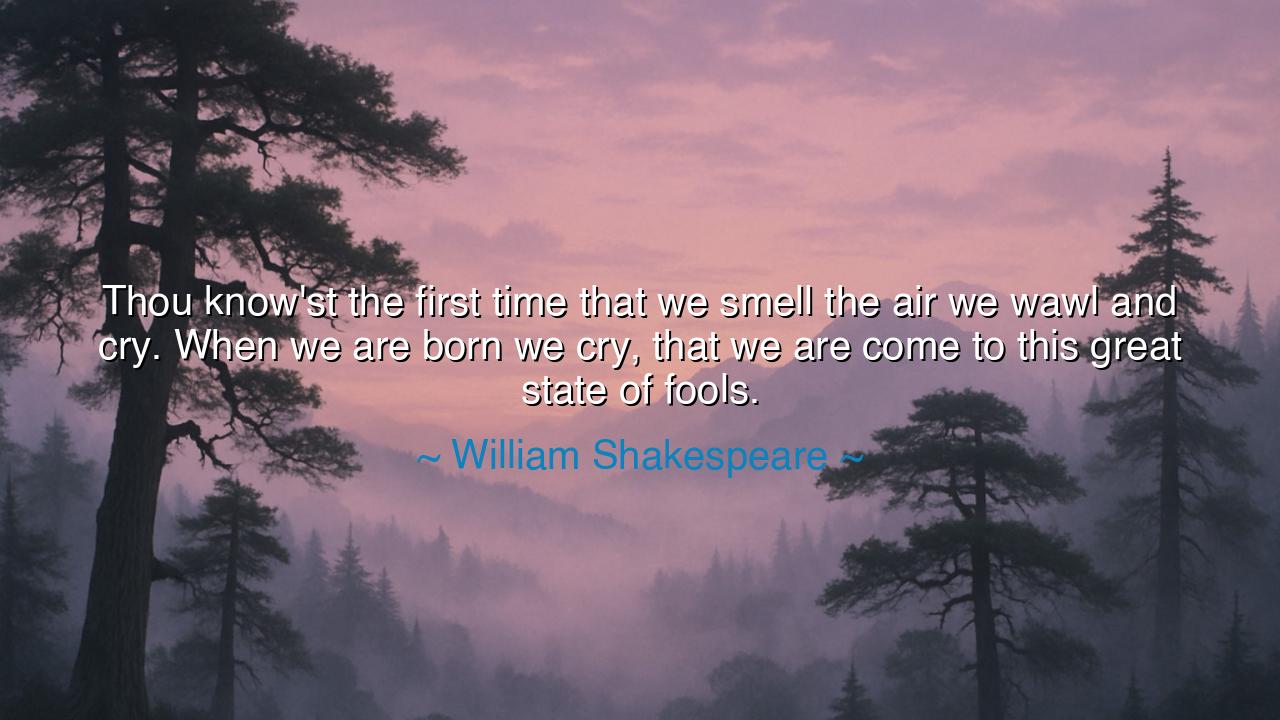
Thou know'st the first time that we smell the air we wawl and
Thou know'st the first time that we smell the air we wawl and cry. When we are born we cry, that we are come to this great state of fools.






The immortal William Shakespeare, ever the poet of the human soul, once wrote: “Thou know’st the first time that we smell the air we wawl and cry. When we are born we cry, that we are come to this great state of fools.” These words, spoken by the tragic King Lear, echo across centuries as both lament and revelation. In them, Shakespeare unveils a truth as ancient as breath itself—that life, from its very beginning, is mingled with sorrow and folly. The newborn’s cry, far from being a song of joy, is a recognition—instinctive and divine—that the world into which we are cast is both wondrous and full of madness.
This line appears in the closing acts of King Lear, one of Shakespeare’s darkest tragedies. Lear, once a proud monarch who divided his kingdom in arrogance, finds himself stripped of power, dignity, and sanity. Betrayed by his daughters, humbled by suffering, and forced to confront the fragility of human pride, he comes at last to see the world for what it is—a place of fools, where wisdom is rare and truth is often punished. Thus, when he utters these words, it is not in bitterness alone but in understanding. He speaks as one who has seen the full cycle of life: from innocence to ignorance, from power to humility. The newborn’s cry becomes a symbol of awakening into imperfection.
In Shakespeare’s time, the notion that life itself was a trial was well understood. The Renaissance man stood at the crossroads of knowledge and despair—aware of human greatness, yet haunted by human folly. The phrase “this great state of fools” captures this paradox perfectly. We are beings capable of love, art, and thought, yet we repeat the same errors of pride, envy, and cruelty that undo us. Lear’s insight cuts to the heart of the human condition: that to live among men is to walk amidst vanity and delusion, and that wisdom is not inherited with birth—it must be earned through suffering.
Consider the life of Socrates, who centuries before Shakespeare drank the hemlock rather than renounce his truth. He, too, called the world a theater of foolishness, filled with those who think they know, yet know not. His calm acceptance of death was not despair but enlightenment—the understanding that wisdom often condemns one to solitude among fools. Lear and Socrates stand as twin figures across time: both punished for seeing too deeply into the illusions of humankind, both finding in their suffering the only form of clarity this world allows.
Yet, within this somber reflection lies a hidden light. For if we are born crying into a world of folly, it is precisely that awareness of folly that gives rise to compassion. To recognize the madness of the world is not to abandon it, but to meet it with mercy. Lear’s final understanding, born of heartbreak, is that love—true, selfless, enduring love—is the only sanity in a world of fools. His reunion with his wronged daughter, Cordelia, though brief and tragic, redeems his spirit. Thus, Shakespeare teaches that enlightenment does not spare us from pain—it teaches us how to bear it with grace.
When we look at our own age—so filled with noise, pride, and division—Lear’s cry feels as new as dawn. Every generation enters the world as if discovering folly for the first time, yet every wise soul comes to the same realization: that the measure of greatness is not in avoiding the world’s foolishness, but in transcending it. We are all born crying, but we need not live in despair. Our task is to rise above the chaos with understanding, to forgive the blindness of others, and to keep faith in the light that suffering reveals.
The lesson is profound and timeless: do not curse the tears with which life begins, for they are the first baptism of wisdom. To see the world’s folly is not cynicism—it is awakening. But awakening must be followed by compassion, lest we become the very fools we condemn. Practical action: when you meet ignorance, answer not with contempt, but with patience; when you see pride, respond with humility. Remember always that every human being, no matter how wise or foolish, began with a cry—and that in that cry lies the shared bond of our fragile, striving humanity.
Thus, Shakespeare’s words remain an eternal mirror. They remind us that though we are born into “a great state of fools,” we are not condemned to remain so. Through awareness, through love, and through the courage to face truth, we may yet turn our tears into wisdom—and our folly into grace.






AAdministratorAdministrator
Welcome, honored guests. Please leave a comment, we will respond soon